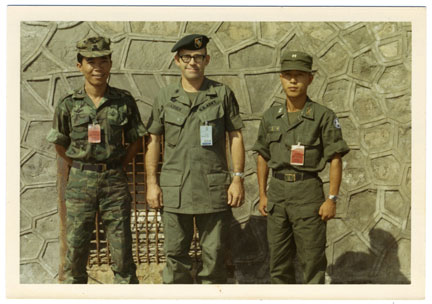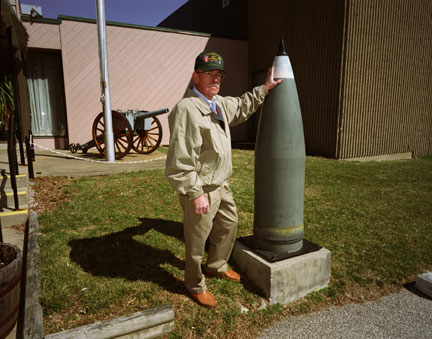Jeffrey A. Wolin: Inconvenient Stories

About the Exhibition
“We were moving the force from the operation in the jungle near Bu Dop. We had about twenty Huey helicopters. We called them, ‘slicks’ … One of our gun ships got shot down- it had taken rounds from the ground through the belly of the chopper. It knocked out the engine and they auto rotated in. You don’t have any power but a helicopter pilot can change the pitch in the last few seconds before hitting the ground to cushion the fall. And they hit pretty hard and it broke the tail off the chopper. It was on fire- it looked like the sun on the ground.” -excerpt of text by Homer “Bud” Lynch
Homer “Bud” Lynch
Lt. Colonel, U.S. Army Special Forces
September 1969 1969 – October 1970
Jeffrey A. Wolin: Inconvenient Stories
These people know things that those of us who weren’t [in Vietnam] have no words to describe or experiences to relate to.
No thinking American alive during the Vietnam War era survived unscathed. And those memories are now being resurrected, or at least revisited, as we are embroiled in another war with less than clear goals, mounting casualties, and returning combat veterans. But the personal memories of those who actually fought in Vietnam have never needed resurrection-combat shifts the mind into the eternally present and eliminates the concept of memory. This exhibition is about those veterans and how their lives today are perpetually informed by their lives then. We can all talk about War in the abstract, and about how it advances or distorts American interests. But we only occasionally get to see the faces and hear the voices of the people who actually did the fighting. These people know things that those of us who weren’t there have no words to describe or experiences to relate to. We can look at them and hear their stories, and even think about the whole issue profoundly, but we can never know what they know.
Jeff Wolin began interviewing and making portraits of Vietnam War veterans in 1992, at the same time that he began a similar project with Holocaust survivors. The latter project took precedence because the subjects were dying and there was some urgency. It eventually became a traveling exhibition and book, Written in Memory(Chronicle Books, 1997). In early 2003, Wolin resumed his work on the Vietnam veteran project by re-contacting those he had worked with earlier and building a network that gained him access to veterans beyond the Midwest. Senator Richard Lugar of Indiana, then spearheading the Veterans History Project, wrote a letter on Wolin’s behalf to Vietnam veterans in Indiana, which ultimately allowed him to expand his network nation-wide. As an official partner of the Veterans History Project, Wolin’s videotaped interviews will be archived at the Library of Congress.
In Wolin’s own words: “From the Iliad onward, war has been a major theme in art and literature. I hope that my photographs and interviews will make a contribution to our understanding of how the trauma of war affects combatants, and civilians caught in literal and philosophical crossfire. Many important issues of war and peace emerge in the stories of these veterans and in the portraits themselves. Many veterans suffer from Post-Traumatic Stress Disorder. Some still wear their Vietnam War medals. Some fight for veterans’ medical issues or make art or write books about their experiences. Others have found ways to put their experiences behind them, often with significant struggle, and to successfully return to civilian life. All were deeply and permanently affected by the war, but the majority are proud of their service.”
In a significant way, this is an exhibition about the inability of photography to record life completely, and especially to record the human consequences of war.
Imagine an expanded version of Wolin’s project-a series of photographic portraits and written interviews of men and women who fought in and survived the Civil War, the Spanish American War, the First and Second Worlds Wars, the Korean Conflict, and so on— normal looking people in their familiar surroundings, occasionally on the margins of society, with horrific stories to tell that we believe because this person in front of us was there and most of us weren’t. In a significant way, this is an exhibition about the inability of photography to record life completely, and especially to record the human consequences of war. We have a pathological confidence in information coming in through photographic media, until we hear the words of an eye witness, reminding us of the first sentence of Herman Melville’s novel, Moby Dick, spoken by the only survivor of Ahab’s ill fated mission:“Call me Ishmael.”
-Rod Slemmons, Director
MoCP is proud to participate in Commit to Memory, a citywide collaboration that explores the complex history, memory and legacy of the Vietnam War through visual imagery, theater and film.
The Jeffrey A. Wolin: Inconvenient Stories exhibitions, presentations, and related programs are sponsored in part by U.S. Bank, the Illinois Arts Council, a state agency; The Kaplan Family Foundation; The Joy Foundation; City of Chicago Department of Cultural Affairs/After School Matters; American Airlines, the official airlines of the Museum of Contemporary Photography, and our members.



Image Gallery

